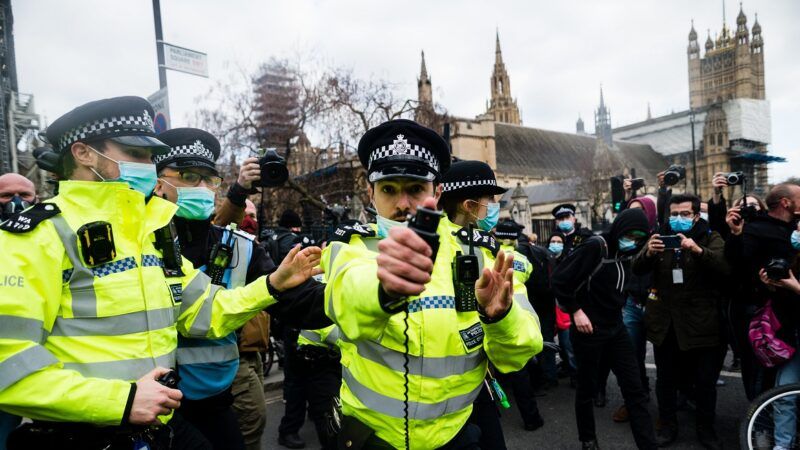Europeans Embrace America's Policing Mistakes
The pandemic pushed Americans to consider police reform while other countries moved to unleash their cops.

With the high-profile trial of former Minneapolis police officer Derek Chauvin for the killing of George Floyd under way, there's no doubt that police conduct remains a serious concern for many Americans. Amid incremental reform, it's hard to know if we'll see a real change in the way law enforcement works in this country, or if the end result will be little more than window-dressing to satisfy government officials' desire for enforcers and much of the public's reflexive deference to uniforms. But, as Americans debate the proper role for cops, similar arguments gain strength in other Western democracies in a world that is more-policed and less-free than it was a year ago.
"Protests continued across the U.K. over the weekend against a proposed law that would increase police powers," CBS News reported March 29. "Clashes between some demonstrators and police in the city of Bristol left 20 officers injured." The demonstrations were partially fueled by the murder of Sarah Everard, allegedly by a police officer.
Similar stories emerged from France in November when "[t]ens of thousands of people took to the streets here to decry police brutality and protest legislation that would restrict people from publishing identifiable images of French police officers," according to the Wall Street Journal. The demonstrations intensified after the publication of a video recording of police beating a black music producer—a recording that might have been banned by the proposed legislation.
Since then, police have clashed with demonstrators in countries including Belgium, France (again), Greece, Germany, Italy, and elsewhere. Mounted police in Brussels trampled a woman at an anti-lockdown party, before opening up with water cannon. In Athens, reports France 24, three officers were injured at a demonstration "which follows an uproar over viral video footage that showed an officer beating a man with a baton Sunday during a patrol to enforce a coronavirus lockdown." The causes vary somewhat, but a common theme has been resentment of pandemic-related restrictions and anger at abusive police enforcement of rules allegedly put in place to protect people.
"Across the world in 2020, citizens experienced the biggest rollback of individual freedoms ever undertaken by governments during peacetime (and perhaps even in wartime)," The Economist's Democracy Index 2020 notes. "In many countries, including developed Western democracies, the normal system of checks and balances was cast aside at the start of the crisis as governments rushed through emergency legislation to give themselves extraordinary powers to regulate and police society."
It would be comforting to think that emergency measures justified on the grounds of a temporary public health crisis would be dropped once that crisis passes, but as the proposed legislation in France and the UK demonstrates, at least some countries want to permanently increase the status and power of police (under pressure, French lawmakers promised to reconsider the bill). Worse, there are strong indications that those measures constitute the fulfillment of preexisting authoritarian tendencies.
"The powers handed to police were too broad in the first place and resulted in heavy-handed policing at a time of severe anxiety for us all," Liberty, a British civil liberties group, objected in May 2020 well before recent legislation became an issue. "If there is a general easement on the lockdown, the police powers must be reduced."
Likewise, French President Emmanuel Macron's favored laws—the one shielding police from scrutiny as well as an earlier domestic security measure—reflect "Macron's apparent conviction that republican principles can be reinforced through the republic's already vast powers of surveillance and prohibition," according to Robert Zaretsky, a professor of history at the University of Houston. "These powers apply not only to suspected terrorists, but to citizens suspected of having participated in protest marches."
That said, police in the United States have traditionally been more brutal than their counterparts in other Western democracies. "Statistical comparisons show that police in the US typically shoot, arrest and imprison more people than similarly developed nations," CNN reported during national protests over police conduct last summer. "The rate of in-custody deaths in the United States is more than double Australia's and about six times the United Kingdom's."
And there are a lot more people in custody to face that risk. The U.S. incarcerates a larger share of its population than comparable nominally free countries, at 698 per 100,000 Americans vs. 141 per 100,000 Britons or 102 per 100,000 French, according to 2018 figures from Prison Policy Initiative. "For four decades, the U.S. has been engaged in a globally unprecedented experiment to make every part of its criminal justice system more expansive and more punitive," the organization observes.
But the U.S. enjoyed unusual (for 2020) if modest improvement in its civil liberties score in The Economist's Democracy Index (it still ranks as a "flawed democracy," largely because of a corroded political culture and dysfunctional government). Jurisdictions including Colorado, Connecticut, and New York City have acted to trim qualified immunity that shields police from lawsuits for misdeeds. Others have moved to make it easier to discipline abusive police officers. Arizona lawmakers recently passed a measure requiring criminal convictions before police can seize people's assets.
Whether these reforms will be enough to rein-in police and redirect the American criminal justice system away from brutalizing the public remains to be seen. In polls, police have regained some of their support since last summer's protests, probably because of social unrest and rising crime. But the discussion in most of the U.S. is over how much to remake, restrain, and even replace traditional policing, not about giving cops more arbitrary power over the population, much of which has grown increasingly skeptical of authority—even if only when it's under the control of political opponents.
Ironically, Americans are having second thoughts about the nation's experiment with uncontrolled and unaccountable policing even as other Western democracies embark on their own journeys down that rocky path.


Show Comments (20)